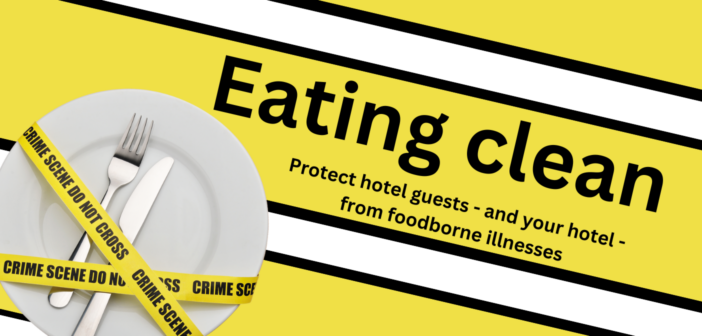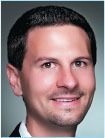Protect hotel guests – and your hotel – from foodborne illness
According to the CDC, roughly 48 million Americans become sick from foodborne illness every year. Of those, 128,000 wind up in the hospital and 3,000 even lose their lives. Whatever the source of the illness, it’s a risk no one can afford to ignore.
Hotels serving food to their guests must do everything they can to prevent the spread of foodborne illnesses such as norovirus, salmonella, and E. coli. These illnesses spread quickly and can impact hundreds of people – even from a single evening – and ruin a hotel’s reputation in the process.
REDUCE THE RISK
Despite the real danger associated with foodborne illness, there are steps that food workers can take to minimize the risk and protect hotel guests and diners alike. Keep these six best practices in mind.
 Require good worker hygiene. The primary way to prevent the spread of foodborne illness is through proper hygiene. Food workers who thoroughly clean their hands according to the recommended practice will essentially eliminate the opportunity to spread germs from one place to another. Additionally, the use of proper clothing and gloves not only protect workers from burns and other hazards, but they also prevent the transfer of germs. All food workers should start the day with clean clothing and aprons, as well as hair and beard nets that completely cover the area. Disposable gloves, such as latex or nitrile gloves, should be used for a single task and then changed to prevent cross-contamination.
Require good worker hygiene. The primary way to prevent the spread of foodborne illness is through proper hygiene. Food workers who thoroughly clean their hands according to the recommended practice will essentially eliminate the opportunity to spread germs from one place to another. Additionally, the use of proper clothing and gloves not only protect workers from burns and other hazards, but they also prevent the transfer of germs. All food workers should start the day with clean clothing and aprons, as well as hair and beard nets that completely cover the area. Disposable gloves, such as latex or nitrile gloves, should be used for a single task and then changed to prevent cross-contamination.
 Ensure proper temperature control. By adhering to strict guidelines for refrigeration, storage, and cooking temperatures, restaurant owners can prevent the growth of harmful bacteria and minimize the risk of food poisoning incidents. Investing in accurate thermometers, training staff on temperature control practices, and implementing food-safety management systems like HACCP are essential steps to maintain optimal food safety. These measures not only protect customers’ health but also uphold the restaurant’s reputation and professionalism. By prioritizing temperature controls, restaurants can ensure their meals aren’t only delicious but also safe for consumption.
Ensure proper temperature control. By adhering to strict guidelines for refrigeration, storage, and cooking temperatures, restaurant owners can prevent the growth of harmful bacteria and minimize the risk of food poisoning incidents. Investing in accurate thermometers, training staff on temperature control practices, and implementing food-safety management systems like HACCP are essential steps to maintain optimal food safety. These measures not only protect customers’ health but also uphold the restaurant’s reputation and professionalism. By prioritizing temperature controls, restaurants can ensure their meals aren’t only delicious but also safe for consumption.
 Take the time to thoroughly clean surfaces. Wiping a surface with a damp cloth may be good enough at home, but it’s not enough to eliminate the germs in a high-use hotel kitchen. There are two components of the process – cleaning and sanitizing – and each component must be performed properly. Be sure all food workers follow the four steps to properly clean a surface that is used during regular food preparations:
Take the time to thoroughly clean surfaces. Wiping a surface with a damp cloth may be good enough at home, but it’s not enough to eliminate the germs in a high-use hotel kitchen. There are two components of the process – cleaning and sanitizing – and each component must be performed properly. Be sure all food workers follow the four steps to properly clean a surface that is used during regular food preparations:
- Wet the area with potable water and rinse off any visible debris.
- Scrub the surface with soap or detergent and potable water to physically remove soil.
- Rinse the surface again with potable water.
- Apply sanitizer following the manufacturer’s directions.
 Put cellphones away. Studies have shown that a high percentage of cellphones – anywhere from 50% to 92% – are contaminated with bacteria and other germs. In today’s world, where Americans admit to checking their phones once every four minutes, enforce a “no cellphone” policy, or at least require all workers to wash and sanitize their hands after they touch their phones.
Put cellphones away. Studies have shown that a high percentage of cellphones – anywhere from 50% to 92% – are contaminated with bacteria and other germs. In today’s world, where Americans admit to checking their phones once every four minutes, enforce a “no cellphone” policy, or at least require all workers to wash and sanitize their hands after they touch their phones.
 Send sick workers home. Despite your best efforts to protect against it, sick workers can and do share their germs not only with other workers but also with the diners eating their food. Managers should send sick workers home when necessary.
Send sick workers home. Despite your best efforts to protect against it, sick workers can and do share their germs not only with other workers but also with the diners eating their food. Managers should send sick workers home when necessary.
 Establish a plan. It’s important to have a plan in place before a guest complains of food-poisoning symptoms. The plan should clearly identify who should speak with the guest and what the response should be. It should also lay out who else to notify, including health inspectors, vendors, and other guests, as well as when they should be notified. Finally, it’s important to record the plan, share it with workers, and practice carrying out the plan as needed.
Establish a plan. It’s important to have a plan in place before a guest complains of food-poisoning symptoms. The plan should clearly identify who should speak with the guest and what the response should be. It should also lay out who else to notify, including health inspectors, vendors, and other guests, as well as when they should be notified. Finally, it’s important to record the plan, share it with workers, and practice carrying out the plan as needed.
If your hotel kitchen does get hit with a foodborne illness, the cost to resolve the issue may be more than you expect. Talk to your broker to discuss supplementing your risk management practices with insurance coverage to support the business during your time of recovery.



 Stefan Burkey
Stefan Burkey

